Day: November 13, 2009
Bad-Ass Bridges
Late this morning I saw Scott Cooper‘s Crazy Heart (Fox Searchlight, early December) and yeah, Kris Tapley was right — Jeff Bridges is definitely in the Best Actor derby for his performance as a grizzled, pot-bellied, booze-swilling, cigarette-sucking ex-country music legend on the downswirl who just manages to save himself from self-destruction. It’s an honestly scuzzy performance — Bridges’ best since The Big Lebowski but tonally opposite and much harder hitting, of course.

Maggie Gyllenhaal, Jeff Bridges, Robert Duvall
It’s the same kind of “look how gross and dessicated I can be” performance that Orson Welles gave in Touch of Evil — and I say that with genuine respect. Bridges really swan-dives into the toilet, you bet. No sweeteners, no movie-star charm moments, no winking…except when he’s on-stage. The fact that he doesn’t seem to be “acting” in the slightest is what makes it great acting. I believed everything he said and did and went through, especially during the wake-up section (i.e., the final 25 or 30 minutes).
Costar Maggie Gyllenhaal could also nudge her way into the Best Actress contenders club, but then she’s always sharp and on-key and totally “there.”
As noted, the only time Bridges’ Bad Blake is “spirited” is when he’s singin’ and playin’. Otherwise he’s a bulky Uriah Heep during a good 75% or 80% of the film. The title of Bruce Beresford‘s Tender Mercies aptly described the story and the tone of that tough little 1983 film, which is similar in many ways to Crazy Heart (boozy broken-down country singer comes back to life through a love affair with a single mom and her son). I don’t know what Crazy Heart is supposed to refer to but it’s not Bridges’ character, I can tell you that. If they wanted to be descriptive they should have called it Boozy Gut, Smokey Lungs, Old Man Beard-o, Dead Man Sweating and Going Down or…whatever, Mr. Emphysema.
Crazy Heart isn’t a country-and-western version of The Wrestler (Hollywood Reporter columnist Stephen Zeitchik is actually the guy who said this) because it doesn’t end on a note of blunt, fuck-all nihilism. It ends with a settled-down, all’s-well epilogue. Which frankly feels tacked on. This isn’t exactly damaging — it’s fairly harmless — but it doesn’t feel like an organic outgrowth of what came before either.
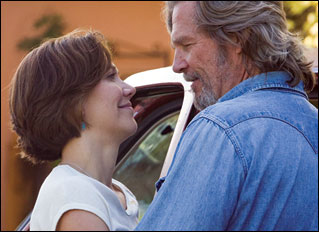
I had a problem with Gyllenhaal’s Jean Craddock, a single mom in her mid 30s, hooking up in a steady way with Bridges’ Blake. Alcoholics can never be trusted to act like adults — they’re basically children — and there’s no reason for a sober, sensible-minded mother with a four-year-old getting serious with a jowly, grungy, cancer-stick addict who’s at least 25 years older than she and basically a disaster-waiting-to-happen. Sooner or later a guy with booze issues (as well a guy in denial about a son that he abandoned in his youth) will endanger her child, and if she doesn’t realize this she doesn’t have my allegiance. It’s just common sense. The only way I would buy her being with Bridges long-term would be if they were both alcoholics. But she’s not so I don’t. Either way Bridges has bigger tits.
I guess I’m saying that as good as Gyllenhaal always is, I wish her character had been a boozer also, as well as a bit fleshier and older herself. Physically she and Bridges just don’t seem like a match. That’s not her fault or his, of course — that’s just me. Me and Cooper, I mean.
Oh, and Duvall! Duvall is solid oak and genuine as hell as a saloon owner and old-time friend of Blake’s. I was soon wishing he had a larger part and more screen time. There’s never been a false moment from this guy. Never has been, never will be.
That scene Duvall had with Steve McQueen in Bullitt 42 years ago was a omen of things to come. Duvall was a San Francisco cab driver, McQueen was in the back, and the cab was idling on California Street. Duvall: “Two.” McQueen: “Two what?” Duvall: “He made two calls. The second one was long distance.” McQueen: “Howdja know it was long distance?” Duvall (irked): “He put a lot of change in!”
Lava Tsunami
Mike Russell‘s latest “Culture Pulp” riff on disaster movies is obviously more informed by Irwin Allen-styled ’70s schlockos than Roland Emmerich‘s 2012, but the rules explained in the last four panels [see below] are followed fairly closely by Emmerich.
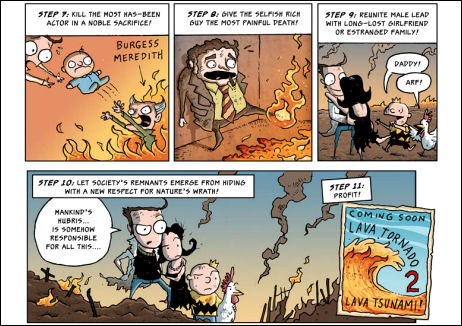
Bee Movie
And speaking of Irwin Allen…that helicopter! 24 inches long, at most.
No Cutting In
If there’s a line of at least five or six people waiting to use the one available bathroom, and if the person currently in the bathroom is either dying or giving birth or typing out the last chapter of a novel on his/her iPhone, then you know you’re at a Starbucks.
Best Ending of the Year
Say what you want about Michael Mann‘s Public Enemies, but the finale — the one-on-one between Marion Cotillard‘s Billie Frechette and Stephen Lang‘s Charles Winstead, a brief jailhouse conversation that ended with the words “Bye-bye, Blackbird” — was the most penetrating of 2009. The best, the most memorable, the most oddly affecting.
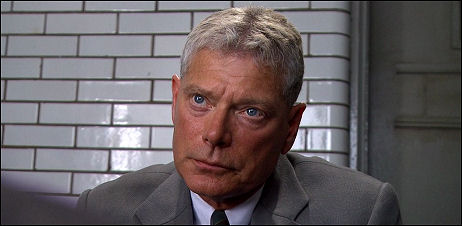
Stephen Lang as Charles Winstead in Michael Mann‘s Public Enemies.
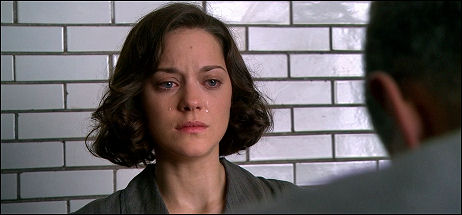
Marion Cotillard’s final moment as Billie Frechette
It was a kind of neat bulls-eye Hollywood moment, and I can’t think of any other ’09 finish that felt quite so “right” and fulfilling. Great endings are half the game in my book, and this one played a big part in the my Public Enemies rave.
“Bye-bye blackbird” were the final words spoken by Johnny Depp‘s John Dillinger as he lay dying on the sidewalk outside Chicago’s Biograph theatre. Winstead is the one who leans close enough to hear them. But when Christian Bale‘s Melvin Purvis asks what he heard, Winstead says “nothin'” or “couldn’t hear” or words to this effect. He lies to his superior.
But in the final scene he leans forward and tells Frechette, and when she hears them she melts and melts some more as the music swells up and over, and we start to feel it too. The irony is that I hadn’t really accepted or invested in the Dillinger-Frechette love story current until that moment, but I suddenly did when this moment happened. An amazing thing, now that I think back.
And I couldn’t even find a still from this scene, much less a YouTube capture. I guess it’ll start turning up when the Public Enemies Blu-ray comes out on 12.8.
I went apeshit for this film but not very many joined me, and I eventually lost the spirit and the will to fight.
I called it “the most captivating, beautifully composed and freshly conceived gangster movie since Bonnie and Clyde. It’s an art film first, a Mann head-and-heart trip second, a classic machine-gun action pulverizer third, and a conventional popcorn movie fourth. [But] the schmucks will go ‘meh.'” And they did do that.
And a lot of HE commenters fell under the impression that I had said it was the best gangster film since Bonnie and Clyde, and that I should have stayed the course and fought it out like Dillinger. But I didn’t say that — I said it was the “most freshly conceived.” Little bit of a difference there.
Man in Black Hat
I don’t see why there’s friction between documentarian Alex Gibney and director George Hickenlooper over the use of the term “Casino Jack” in the titles of their respective Jack Abramoff films. HIckenlooper’s film, a feature starring Kevin Spacey as Abramoff, is called Casino Jack, and Gibney’s is called Casino Jack: The United States of Money. I can tell the two apart easily. Both could play Sundance 2010…maybe.
Gilroy + Hurt Team
A Hurt Locker q & a was moderated last night by director-screenwriter Tony Gilroy following a 6 pm screening at Manhattan’s DGA theatre. (l. to r.) Gilroy, Hurt Locker director Kathryn Bigelow, screenwriter Mark Boal, costar Anthony Mackie, and…I’m sorry but I didn’t write down the name of the bearded guy on the right. It could have been producer Nicolas Chartier or associate producer Jack Schuster or producer Greg Shapiro. No disrespect intended.
It’s been 14 months since I first saw The Hurt Locker at the ’08 Toronto Film Festival. And it’ll be a topic of interest for the next three and a half months, presuming it gets nominated for Best Picture, Bigelow gets nominated for Best Director, and Boal snags a Best Original Screenplay nomination. (Which will probably happen.)
“Set in Baghdad and the full maelstrom of that godforsaken conflict, this is a full-power throttle, nail-biting, bomb-defusal suspense film that gradually becomes a kind of existential nerve ride about the risk and uncertainty of everything and anything,” I wrote on 9.8.08. “The Hurt Locker is absolutely a classic war film in the tradition of Platoon, The Thin Red Line, Pork Chop Hill, Paths of Glory and the last 25% of Full Metal Jacket.”
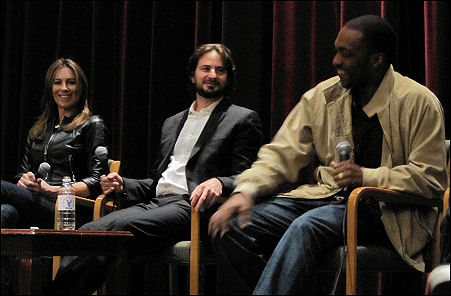
(l. to r.) Bigelow, Boal, Mackie — Thursday, 11.12, 8:50 pm.
No Dodge
“Defense Lawyer: Fort Hood Shooter Could Be Paralyzed” (11.13 AP story). HE reaction: That’s a start. This is straight out of the Glenn Beck playbook and I’m sorry, but Maj. Nidal Malik Hasan must swing for this. If he doesn’t, the crowd in the Place de Concorde will make their feelings known.
Roadblock
Dead Time Warner wifi in the apartment with the repair guy not able to visit until next Tuesday. ATT air-card wifi on the laptop spotty at best and randomly disconnnecting whenever it feels like it. An urgent visit to the local post office required due to curious refusal of postman to leave letters addressed to me here, and a screening of Crazy Heart at 11 am in Manhattan. I have all this good stuff to post but I know when I’m temporarily beaten. All she wrote until mid-afternoon.
Detective #1: “I think God hates me.” Detective #2: “Hate him right back. Works for me.” What film? Easy one.
Bayou Fruitloop
It’s not that I’ve discounted Nicolas Cage’s loop-dee-loop jazzman performance in Werner Herzog‘s Bad Lieutenant: Port of Call New Orleans. For an actor whose stock in trade is to convey varying degrees of derangement whatever the role, Cage hits a 21st Century high as Lt. Terence McDonagh — a wackazoid refrain of Cage’s legendary Peter Loew in Vampire’s Kiss.
To truly commune with an inspired Cage performance is to drop a tab of mescaline, jump off a 700-foot cliff in Yosemite National Park and howl like a coyote all the way down.
I’ve presumed all along that Academy voters would most likely undervalue (or even dismiss) Cage’s Lieutenant performance because it’s too Miles Davis, too much in the realm of instinct and mad brushstrokes. But maybe I’m wrong. It would be nice — hell, glorious! — if I am.
